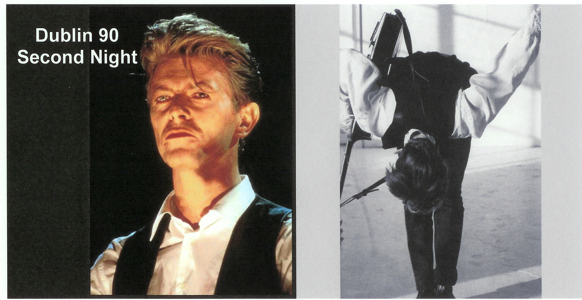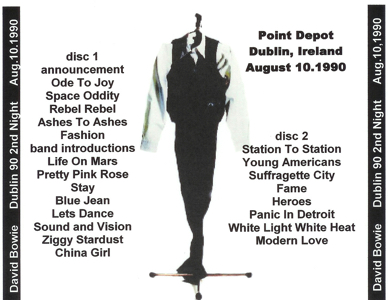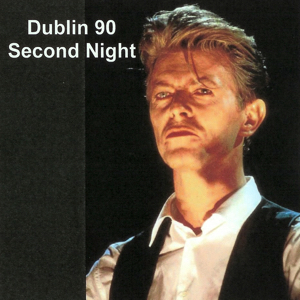David Bowie 1990-08-10 Dublin ,The Point Depot – Dublin 90 Second Night –
Sound Quality Rating
01. Ode to Joy.flac
02. Space Oddity.flac
03. Rebel Rebel.flac
04. Ashes To Ashes.flac
05. Fashion.flac
06. Band Introductions.flac
07. Life On Mars.flac
08. Pretty Pink Rose.flac
09. Stay.flac
10. Blue Jean.flac
11. Let’s Dance.flac
12. Sound And Vision.flac
13. Ziggy Stardust.flac
14. China Girl.flac
15. Station To Station.flac
16. Young Americans.flac
17. Suffragette City.flac
18. Fame.flac
19. “Heroes”.flac
20. Panic In Detroit.flac
21. White Light White Heat.flac
22. Modern Love.flac
Label : No label
Audio Source : audience
Lineage : 2 x c90 Cassettes (low gen, possibly 3rd.)
Taper: ???
Recording Location: ???
Total running time : 1:35:36
Sound Quality : noise ,dull ,but still good listened to
Attendance : ???
Artwork : Yes


9 and 10 August 1990 at The Point Theatre, Dublin
Review: Dave Fanning
This was better than anyone expected, and at least as good as we’d hoped. With an awesome yet deceptively simple stage show designed for outdoor arenas or at least for venues that can hold 15,000 plus, Irish fans were treated to the best in sound and vision from the man who electrified the ‘70s and who, let’s face it, has slummed it throughout the ‘80s.
But the self-importance of presenting a “Greatest Hits” package did not manifest itself in the form of half-hearted renditions of perpetually resonant songs or embarrassing attempts at high-concert dramatics.
Instead, Bowie felt he had a right to give a selection from his impressive scrapbook, honest, impassioned and sometimes crudely-honed (usually courtesy of guitarist,
Adrian Belew) interpretations. The result was usually electrifying and often exhilarating.
From the opening – an acoustic driven “Space Oddity”, delivered more as a basic song than some sort of prophecy – he set the standard for the evening. “Rebel Rebel” and “Ashes to Ashes” followed and we all settled down to the most satisfying rock cabaret we are ever likely to see.
The silk screen, lowered and raised repeatedly, predominantly featured enormous projected images of Bowie and a female dancer. Technically, this was pretty awesome and thankfully, it was never intrusive.
The music was always upfront and the sheer spectacle which was rounded out by the industrial stage props and the huge TV screens at either side (which, incidentally, were comically over-the-top in the perfect synchronicity stakes) left Bowie driving a stake through the heart of The Glass Spiders.
The music always had a very definite sense of historical authenticity. He was able to shift personae without relying on costume changes or physical manipulation and the stylish period touches were well judged.
Overall, there are reasons to be cynical, especially when discussing sequencers, samplers and tapes, but I wasn’t in a cynical mood and I’m going back for more tonight.



